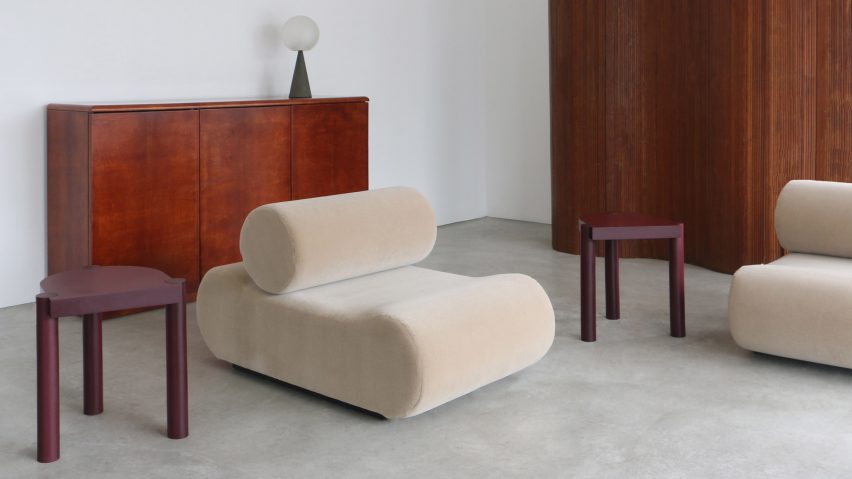London studio EBBA Architects has branched out into furniture design with the release of a recycled paper stool that can be used alone or combined in pairs to form a coffee table.
The Plod stool consists of four flat-pack elements – a seat and three legs – all made entirely of a single material called Richlite.
This recycled paper composite is commonly used to make cladding, countertops and skate ramps.
But so far, the material has been grossly underappreciated by the furniture industry, according to EBBA Architects co-founder Benni Allan.
"It's not a material that has yet been used much in furniture and this is one of the first stools," he told Dezeen.
"Previously it was used primarily for surfaces in kitchens and carpentry but we were able to source bespoke panels that are thick enough to produce the stool's unique geometries."
The material is made by soaking lengths of recycled paper in a thermosetting resin and stacking them on top of each other in alternating grain directions.
These layers are then bonded together using heat and pressure to create a durable, hardwearing material.
"The most interesting aspect of the material is the way the surface shows the patina and makeup of the paper," Allan said. "The surface has a very tactile quality, with a mottled quality of laminations combined with a very smooth finish."
The resulting material can be milled, routed and joined much like regular hardwood.
For the Plod stool, EBBA Architects combined modern and traditional fabrication techniques, CNC cutting the seat while lathe turning the legs.
"We use the traditional process of making spindles for stairs in a local workshop in east London," Allan explained. "The construction is intentionally designed to be as simple as possible with a repeated joint system. This allows the stool to be shipped fully assembled or flat-packed."
Plod can be assembled in three moves, using three identical tongue-and-groove joins that connect the seat to the legs while also providing a visual detail on the stool's surface.
The seat is generously rounded but also has one straight edge, allowing it to sit flush with another Plod stool to form a larger coffee table.
"It forms part of a collection EBBA is developing, looking at ways to make larger pieces of furniture through repeated parts that can be stacked or joined together," Allan said.
Many of EBBA Architects' architecture and interiors projects also make use of traditional joinery.
Last year, the studio constructed a double-height ash and pinewood storage wall and staircase for a remodelled apartment in London's East End, as well as creating a reusable facade screen system for the Construction Skills School using off-the-shelf timber.
The photography is by Marta Fernàndez.

